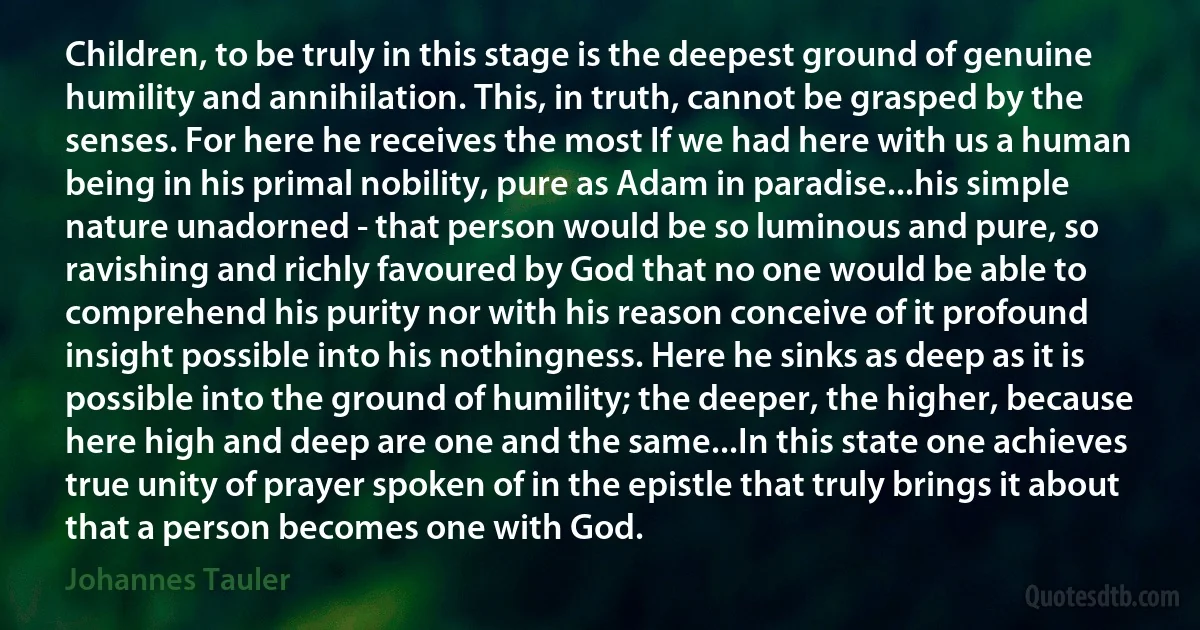
Children, to be truly in this stage is the deepest ground of genuine humility and annihilation. This, in truth, cannot be grasped by the senses. For here he receives the most If we had here with us a human being in his primal nobility, pure as Adam in paradise...his simple nature unadorned - that person would be so luminous and pure, so ravishing and richly favoured by God that no one would be able to comprehend his purity nor with his reason conceive of it profound insight possible into his nothingness. Here he sinks as deep as it is possible into the ground of humility; the deeper, the higher, because here high and deep are one and the same...In this state one achieves true unity of prayer spoken of in the epistle that truly brings it about that a person becomes one with God.
Johannes TaulerRelated topics
able adam annihilation children deep epistle ground high human nature nobility nor nothingness paradise person possible prayer primal pure ravishing reason simple speak state truth higherRelated quotes
Justice is the end of government. It is the end of civil society. It ever has been, and ever will be, pursued, until it be obtained, or until liberty be lost in the pursuit. In a society, under the forms of which the stronger faction can readily unite and oppress the weaker, anarchy may as truly be said to reign, as in a state of nature where the weaker individual is not secured against the violence of the stronger: And as in the latter state even the stronger individuals are prompted by the uncertainty of their condition, to submit to a government which may protect the weak, as well as themselves: so in the former state, will the more powerful factions be gradually induced by a like motive, to wish for a government which will protect all parties, the weaker as well as the more powerful.

Alexander Hamilton
Centuries ago, sailors on long voyages used to leave a pair of pigs on every deserted island. Or they'd leave a pair of goats. Either way, on any future visit, the island would be a source of meat. These islands, they were pristine. These were home to breeds of birds with no natural predators. Breeds of birds that lived nowhere else on earth. The plants there, without enemies they evolved without thorns or poisons. Without predators and enemies, these islands, they were paradise. The sailors, the next time they visited these islands, the only things still there would be herds of goats or pigs. .... Does this remind you of anything Maybe the ol' Adam and Eve story .... You ever wonder when God's coming back with a lot of barbecue sauce.

Chuck Palahniuk
Let us imagine that the aboriginal-original human specimen was one of two brother apes, A and B; they were alike in every respect; both were animal space-binders; but something strange happened to B; he became the first time-binder, a human. ... He had thus a new faculty, he belonged to a new dimension; but, of course, he did not realize it; and because he had this new capacity he was able to analyze his brother "A"; he observed "A is my brother; he is an animal; but he is my brother; therefore, I AM AN ANIMAL." This fatal first conclusion, reached by false analogy, by neglecting a fact, has been the chief source of human woe for half a million years and it still survives. ... He [then] said to himself, "If I am an animal there is also in me something higher, a spark of some thing supernatural."

Alfred Korzybski
For what advantage is it, that the world enjoys profound peace, if thou art at war with thyself? This then is the peace we should keep. If we have it, nothing from without will be able to harm us. And to this end the public peace contributes no little: whence it is said, ‘That we may lead a quiet and peaceable life.' But if any one is disturbed when there is quiet, he is a miserable creature. Seest thou that He speaks of this peace which I call the third (inner, ed.) kind? Therefore when he has said, ‘that we may lead a quiet and peaceable life,' he does not stop there, but adds ‘in all godliness and honesty.' But we cannot live in godliness and honesty, unless that peace be established. For when curious reasonings disturb our faith, what peace is there? or when spirits of uncleanness, what peace is there?

John Chrysostom
All the virtues which appeared in Christ shone brightest in the close of His life, under the trials He then met. Eminent virtue always shows brightest in the fire. Pure gold shows its purity chiefly in the furnace. It was chiefly under those trials which Christ endured in the close of His life, that His love to God, His honor of God's majesty, His regard to the honor of His law, His spirit of obedience, His humility, contempt of the world, His patience, meekness, and spirit of forgiveness towards men, appeared. Indeed, every thing that Christ did to work out redemption for us appears mainly in the close of His life. Here mainly is His satisfaction for sin, and here chiefly is His merit of eternal life for sinners, and here chiefly appears the brightness of His example which He has set us for imitation.

Jonathan Edwards (theologian)
